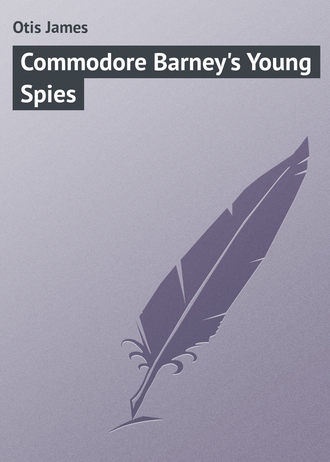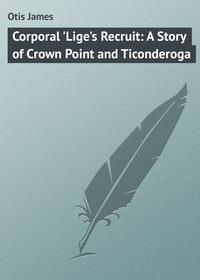
Commodore Barney's Young Spies
The scoundrel was as meek as any lamb, and when Darius told me to fasten his arms together with my belt, he held them out obediently.
I took a double turn around his elbows, and Darius ordered him to step into our canoe, which he did without hesitation, but once there, seated on the flooring of the boat with his back against the old man's knees, he glowered at us like an angry cat.
"We reckoned you wanted to see Barney's fleet, when you put off from Benedict, an' it ain't jest right to make you paddle a heavy canoe so far," Darius said grimly. "You're goin' back with us, Master Macomber, an' this time you'll stay."
"Not very long," the reptile said with a snarl. "Admiral Cochrane declares that he'll destroy Barney's fleet Friday, an' dine in Washington Sunday. So you see I'm not likely to stay with you any great while after the British come up the river."
"That is as may be; now I'm countin' that when your admiral gets as far up the river as Nottingham, if he ever does, you'll be somewhere else, for we've taken you in charge."
"My time will come, an' then I'll pay off a good many old scores," Macomber cried with a look on his face which was not pleasant to see.
"If it does you any good, keep right on thinkin' so," Darius replied mildly, "an' in the meantime we'll keep our eyes on you. Give way, lads, the sooner we're with the fleet now, the better it will be."
We had no more than settled well to work when Darius ordered us to cease paddling, as he half rose to peer steadily ahead, and, quite naturally, all of us glanced in the same direction.
A canoe carrying four men was coming down stream, and while I was asking myself if we might not have come upon more British spies, the old man settled back with a sigh of relief.
"It's the Byard boys goin' home," he announced, and then, as the other canoe came within hail, he gave them information of what was happening at Benedict.
"It don't look as if we'd better go back there," Sam Byard said thoughtfully when Darius had come to an end of his news. "I reckon the Britishers might make trouble for us, eh?"
"They'd be apt to if it was known you'd just come from our fleet," the old man replied with a laugh. "The best thing you can do is to turn around an' follow us. Did you get your money?"
"Oh yes, the commodore handed that over all right."
"Where is Jim Freeman?" I asked.
"The commander allowed it wouldn't be many hours before all hands of you came back, so he went aboard the pungy to keep ship."
"There!" Darius said triumphantly. "You can see how near Joshua Barney comes to the truth when he makes a guess! I believe he could stay at Nottingham without ever gettin' a report from anybody, an' tell just what the enemy was doin'."
"He'll have a chance to see what they're doin', as soon as some of the ships can be floated!" Macomber said with a laugh which was not pleasant to hear.
"Which is more'n you can say for yourself if there's any danger of the Britishers comin'," Darius retorted. "You're our meat, Master Traitor, an' will stay in the same keepin' till we've settled our part of what you call old scores."
Then the word to buckle down to the paddles once more was given, and the Byard boys pulled their craft around to follow in our wake.
An hour later we were alongside the Scorpion again, and this time it was not necessary to parley with those on the guard-boat, for, on recognizing us, they sheered off, leaving our canoe to go where we pleased.
Neither did the guard on the schooner hesitate to arouse the commodore, and within one minute after arriving, Darius was explaining to the commander all that had taken place at Benedict.
"It must be they counted on coming further up the river," the commodore said half to himself when the story was come to an end, and Darius took it upon himself to add:
"I allow there wouldn't have been any stop if the fleet hadn't gone ashore; then the men were landed to prevent you from makin' an attack."
"That seems reasonable; but they'll be here soon enough, for it is to this place they must come in order to strike the direct road to Washington."
Then it was that Darius bethought himself of what Macomber had said, and he repeated the words, adding in conclusion as he laid his hand on the prisoner's shoulder, for as yet we had not left the canoe:
"We've brought this cur back, sir, an' hope he won't find it as easy to slip away a second time. He left Benedict to spy on you, as we saw from the other side of the river, so we gathered him in."
The commodore looked at the man as one would at a snake, and then said curtly:
"You'll have to keep him on board your vessel, Darius. Our facilities for taking care of prisoners are not what they should be. Do whatsoever you will with him, so that we can make certain of putting our hands on him when the matter is to be settled. You had better take up your quarters on the pungy, and if you're needing provisions, my cook will supply you until rations are dealt out."
Then the commodore turned on his heel, returning to the cabin, and we pulled around the fleet hunting for the Avenger.
Not until after getting speech with the officer in charge of the guard-boat did we find the craft, and when we came alongside Jim Freeman acted as if beside himself with joy. One would have said that we had been separated a full year by the way he welcomed us, and when his eyes fell on Elias Macomber it was as if he had lost his senses.
Well, we took the prisoner aboard the pungy, securing him in the hold by lashing his hands behind him, and making them fast to a ringbolt, thus giving him a chance to sit down; but he could neither stand nor stretch out at full length.
"It won't be none too comfortable; but it's the best we can do now," Darius said to the prisoner as if apologizing for not making him more secure. "At all events, I reckon you'll be here in the mornin', an' then we may make a change."
The main hatch was put on and fastened down with the bar, after which we went into the cuddy, ready for anything in the way of provisions that Jim could set before us.
He was not overly well supplied, having been on board only a few hours, but we contrived to make a hearty meal, and while eating Jim heard all we could tell him regarding the occupation of Benedict by the British forces.
It was past midnight when we turned in, so tired that all hands fell asleep within two minutes after making ready, and it seemed to me that I had not fairly closed my eyes when we were awakened by a vigorous pounding on the side of the vessel.
Darius had his head out of the companion-way before it was possible for me to get on my feet, and I heard a strange voice cry sharply:
"It is the order of the commodore that every vessel in the fleet move up to Pig Point without delay. Rations will be served there at noon to-morrow."
Then I heard the sound of oars as the messenger-boat was pulled to the next craft, and Darius said hurriedly:
"Lads, I'll admit that there are a good many vessels in this 'ere fleet what can sail clean around the Avenger; but let's show the commodore that there's no crew under him who will obey orders more smartly. Turn out lively, my bully boys! Jim, you an' Dody get home the anchor, an' the rest of us will tail on to the halliards!"
Darius had a willing crew if there was any opportunity to win the praise of the commander, and he was not yet at an end of giving his orders when we began work.
I venture to say that within sixty seconds from the time we were hailed, the Avenger was making way, rubbing past this craft and that as she literally forced a passage through the fleet, and all this before any signs of life could be seen on the other vessels. Even the Scorpion was yet lying idly at her moorings.
"That's what I call a good start, lads," the old man said when we were well clear of the flotilla, and the pungy forged ahead in good style under the force of a fairly strong night breeze. "We're first under sail, an' it'll go hard if we don't come to anchor off Pig Point ahead of any one else."
"Why do you suppose this move is being made?" I asked, for it smacked much of running away from the enemy, to retreat so far up stream, and Darius had made us believe that Joshua Barney never retreated.
"The commander has got some good plan in his head, an' it'll come out before we're many days older," the old man replied confidently.
"But surely we're tryin' to get away from the enemy," Jerry suggested.
"Ay, it has that look just now, I'll admit; but you'll see some big scheme in it very soon, or I'm a Dutchman, which I ain't."
"There's a boat dead ahead, with four men rowin' an' one steerin'," Jim Freeman, who had stationed himself in the tow as a lookout, came aft to report.
"Some smarty who's tryin' to make the anchorage first," Darius growled; "but with this wind we can sail two miles to his one, so it won't be that craft which will beat us in."
By this time we were well up with the boat, and to our surprise it was Commodore Barney himself who hailed:
"Sloop ahoy! Pass a line, and I'll come aboard."
He got the line smartly enough, and when he came over the rail Darius saluted, as he said:
"We counted you were aboard the Scorpion, sir."
"That schooner won't get off for ten minutes or more, and I allowed that the other vessels would be handled in the same leisurely fashion, so, I pulled ahead, thinking to be at the rendezvous before the flotilla was well under way. You lads obeyed orders smartly."
"It's a way they have, sir," Darius said with a grin, as he looked over the rail to see that the commodore's boat was being towed where she would be the least drag on the pungy.
Then it was that I tried to play the host, by asking the commander if he would go into the cabin.
"It isn't a very nice place, sir; but it's clean, and you may be able to get some sleep."
"I'll venture to say it's as good a sea-parlor as I, or any other man, deserves, lad; but I'm not needing sleep just now, therefore will stay on deck."
Then he fell to pacing the starboard quarter, as if he had been on his own ship at sea, and we lads gathered well forward in order that he might see we understood somewhat of the respect due a commander.
CHAPTER XII.
SUSPENSE
It is now in my mind to set down what may be dry reading for some who chance to see this labor of love on which I am engaged, and yet if any one desires to know exactly why it was the Britishers could destroy the capital of our country, and come off very nearly scot-free, it is absolutely necessary to become familiar with all our means of defense at this time.
Therefore it is that I shall copy that which was published many years later, by Mr. Lossing in his "War of 1812," and in so doing the reader will ask how it is that I am writing this poor apology for a tale in the year of grace 1814, and yet putting into it facts which were made public many years later?
The answer to the riddle is not as puzzling as it would seem. I am now man grown, with children of my own. Many years ago I put together this story, and to-day, desiring that my own boys may read it, I am running over the leaves to add here or there that which may make plain what I, a lad of seventeen years, overlooked at the time, or believed to be of little importance. How strange it is that the same thing appears entirely different when viewed from the standpoints of a man and a lad!
This is what Mr. Lossing says concerning the time of which I wrote when everything was fresh in my mind, and the sense of a wrong done this country by England still rankling deep in my heart:
"On the 6th of August (1814) the small British squadron in the Chesapeake was reinforced by a fleet of twenty-one vessels under Admiral Sir Alexander Cochrane, the senior commander on the American station. These were soon joined by another under Commodore Sir Charles Malcolm. These vessels bore several thousand land troops commanded by General Ross, an Irish officer, and one of Wellington's most active leaders. Washington and Baltimore appear to have been chosen objects of attack simultaneously. A part of the British naval force, under Sir Peter Parker, went up the Chesapeake toward Baltimore, and another portion, under Captain Gordon, went up the Potomac.
"At that time Commodore Barney, with a flotilla of thirteen armed barges and the schooner Scorpion, with an aggregate of about five hundred men, was in the Patuxent river. His vessels had been chased out of the Chesapeake, and blockaded in St. Leonard's Bay. Of this confinement they were relieved by some artillery under Colonel Henry Carbery, with which he drove away the Loire, the blockading frigate, when the released flotilla went up the Patuxent, first to Benedict, and then to Nottingham, that it might be within co-operating distance of both Washington and Baltimore.
"Seeing this, the British determined to capture or destroy it, and on the 18th of August a force of a little more than five thousand men, composed of regulars, marines, and negroes went up the Patuxent, and landed at Benedict with three cannon, under cover of an armed brig. Most of the other large British vessels were below, some of them aground, and all too heavy to ascend the comparatively shallow stream.
"Barney, then at Nottingham, promptly informed the Navy Department of the movement, and of a boast of the British admiral that he would destroy the American flotilla, and dine in Washington on the following Sunday. General Winder, by direction of the War Department, immediately ordered General Samuel Smith's division (the Third) of the Maryland militia into actual service. He also called upon General John P. Van Ness, commander of the militia of the District of Columbia, for two brigades, to be encamped near Alexandria; and he sent a circular letter to all the brigadiers of the Maryland militia, asking for volunteers to the amount of one-half their respective commands.
"By his orders, his adjutant-general, Hite, issued a stirring appeal to the citizens to come forward, 'without regard to sacrifices and privation,' in defense of the national capital. Winder also asked General Stricker, of Baltimore, to send to Washington his volunteer regiments of infantry and his rifle battalion.
"The veteran patriot, General Smith, promptly responded to the call of the government. He at once issued a division order, in which he gave notice of the invasion, and directed the whole of General Stansbury's brigade to be held in readiness for active service, adding, 'the third brigade is now under the pay of the United States, in its service, and subject to the Articles of War.' That corps General Smith declared to be 'the finest set of men he ever saw.' They paraded at four o'clock the same day, and on the following morning General Stansbury left Baltimore for Washington with thirteen hundred of his corps. Another force, under Lieutenant-Colonel Joseph Sterett, consisting of the Fifth Regiment of Baltimore Volunteers, Major Pinkney's rifle battalion, and the artillery companies of Captains Myers and Magruder, left Baltimore on the evening of the 20th, and joined Stansbury on the evening of the 23d.
"With wise precaution, General Smith ordered the Eleventh brigade and Colonel Moore's cavalry to hold themselves in readiness to march to Baltimore at a moment's warning, for it seemed probable that the enemy would strike at both cities simultaneously.
"The British in the meantime had moved up the Patuxent from Benedict, the land troops being accompanied by a flotilla of launches and barges that kept abreast of them. The naval forces were under the command of the notorious marauder, Cockburn. They reached Lower Marlborough on the 21st, when Barney's flotilla, then in charge of Lieutenant Frazier and a sufficient number of men to destroy it if necessary, moved up to Pig Point, where some of the vessels grounded in the shallow water.
"For the defense of Washington the whole force was about seven thousand strong, of whom nine hundred were enlisted men. The cavalry did not exceed four hundred in number. The little army had twenty-six pieces of cannon, of which twenty were only six-pounders. This force, if concentrated, would have been competent to roll back the invasion had the commanding officer been untrammeled by the interference of the President and his Cabinet."
All that was written when the facts of the case were well known, and now the story shall be taken up as I wrote it when a boy.
It was not all plain sailing from Nottingham to Pig Point, for the water was shallow, and there were many places where it was necessary to handle even a pungy very tenderly in order to avoid taking the ground.
While Darius was not well acquainted with the stream, he had a sailorly eye for bad places, and never made the mistake of trying to jump the little vessel where she was likely to be held hard and fast.
Many times were we forced to take to the canoe in order to pull the Avenger's nose around more sharply than could be done by the helm, and when it came to such labor of pulling and hauling the commodore lent a hand as if we had been his equal in station.
And we did work lively, for a fact, hoping to have our anchor down before any other craft could arrive, therefore no one complained when Darius called on us for labor which might have been saved at the expense of three or four minutes in time.
The commander was even more eager than were we, to arrive at the appointed rendezvous speedily, and we could readily guess that some big change was to be made in the general plans, although what it might be we came far from guessing, since all of us, save Darius Thorpe, believed he was simply running away from the enemy.
Well, we succeeded in doing as we wished in regard to beating out the remainder of the fleet, for when we came to anchor off the point and snugged everything down Bristol fashion, there were no signs that a single craft was following.
Commodore Barney was chafing because of the delay, as could be seen by the way in which he paced the deck, rubbing his hands from time to time as he gazed down stream in vain for some token of the laggards.
"It's only a deep water sailor who obeys smartly, Darius," the commander said, halting in his nervous walk to face the old man, and Jerry and I, who were seated on the main-hatch, pricked up our ears, for it seemed positive we were to learn somewhat of future doings.
"These younger men know too bloomin' much, that's what's the matter with them," Darius said in reply. "I'll go bail that half the crowd we left at Nottingham believed they knew better'n you when the start should be made, an' stopped to curl their hair before makin' sail."
Commodore Barney laughed heartily at the old man's growling, and then said suddenly:
"I count on leaving you second in command under Frazier, and it may be as well for you to understand matters in case I don't get a chance to speak with you at any length after the Lieutenant arrives."
"You count on leavin' me, sir? Does that mean you're goin' away right soon?"
"Ay, when my force comes up. There is no question but that the enemy is making the attack on our flotilla to cover his designs on Washington. He can have the fleet if he comes thus far. I hope by daylight to be on the march for the Wood Yard, where Winder is encamped, and count to take with me all the men that can be spared, for force enough will be left behind to destroy the fleet in case the enemy appears. Lieutenant Frazier is to be in charge of those who remain here, and you will act as his second in command. This is my plan: You shall have seventy men or more, and as soon as we leave you will make every craft ready for the torch; see to it that there are combustibles on board in sufficient quantity to insure a clean job when fire is applied. After that has been done, you will wait for the British. Once it becomes certain that you cannot save the fleet, start your fires, and put out for the American army, which will likely be near Washington by that time."
"We've got some good boats with us, sir," Darius said thoughtfully.
"Ay, my old shell-back, and that is why I am determined that they shall not be of service to the enemy. You who remain behind will have more danger to face than those who move in advance, and because of that it is necessary you keep the force well in hand. See to it that every order, however trifling, is obeyed on the instant, and in event of any disposition to shirk a command, or to loiter after the word has been given, deal with the culprit as you would on shipboard. Quick work is the only thing which will save you from being killed or made prisoners."
When the commander spoke this last word the thought came to me that I had, for the moment, entirely forgotten Elias Macomber, and I was puzzled to know what could be done with him while we were destroying the fleet, if it so chanced we were forced to such an extremity.
I spoke with Jerry about it; but he had no suggestion to offer, save that I had better refer the matter to Joshua Barney.
"He's forgotten all about Macomber, as we did, an' now is the time to find out what we shall do with him. It would hurt me mighty bad to let the cur join his British friends simply because we couldn't take care of him."
This last idea nerved me to do that which I would have shrunk from at any other time, and, approaching the commander, I asked:
"What is to be done with our prisoner, sir? Jerry and I couldn't help hearing what you said to Darius, and we don't want to let such as him have a free foot after capturing him twice."
"Don't fear for that, lad," the commodore said with a kindly smile. "Give your man breakfast now, so that he may be in condition to march, and when you see that we are ready to set off, bring him to me. I will see to it that he has a care-taker who won't wink at an escape."
Then the commander fell to pacing the deck again, and I called Jim Freeman and Dody Wardwell into the cuddy that they might cook breakfast for all hands, including Elias Macomber.
Jerry insisted that the cur ought to be sent on his way with an empty stomach; but to that I would not have agreed even though the commodore had failed to give especial orders to the effect that he be fed.
By the time our cooking operations were well under way, the foremost of the fleet began to heave in sight, and from that moment Joshua Barney had something more to do than pace the Avenger's deck.
We learned very soon that the Scorpion had run aground, which fact delayed several of the smaller boats, since Lieutenant Frazier called upon many of the men for assistance; but all reports ran to the effect that the fleet would unquestionably be at the rendezvous by early dawn.
We drew lots to see who should feed the prisoner, and Josiah Coburn selected the unlucky slip, which was a great relief to me, for I question if I could have put food into the villain's mouth with any very good grace.
We were yet at work on the breakfast when my father came aboard, the barge to which he was drafted having been the third to arrive, and it made me feel mighty good when he complimented us on our smartness in handling the Avenger.
We two went well forward where we might converse privately, and I did not think I was betraying any confidences when I told him of the commodore's plans. He was in nowise surprised, and said as one would if talking to a particular friend:
"I guessed that something of the kind might be in the wind when the word was given to get under way. It would have pleased me better, Amos, if you had been detailed to go with the advance."
"Why so, sir?" I asked, secretly rejoicing because he was treating me as if I had been of his own age.
"Because those who remain to destroy the fleet will be in great danger. You cannot begin the work until the enemy is close upon you, otherwise it might be said that valuable property had been sacrificed needlessly, and your risk will be greater than mine."
"That is as it should be, sir," I replied, forgetting that I had ever been weak-kneed or lukewarm in the cause. "For mother's sake you should be the one to go home, if both cannot."
"You have ever been a good boy, and a dutiful son, Amos. I shall pray that God will spare your life, whatever He may will shall become of me."
Then my father kissed me, and I never remember of his having done such a thing before, after which he went over the rail hurriedly, as if not caring to look me in the face.









